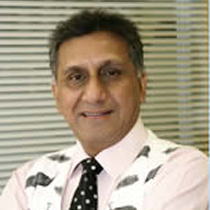
In the wake of the Human Genome Project, which sought to describe in detail the genetic architecture of human beings, there is a sober realisation that the tools that will seep into educational and clinical practice in the next decade may be remarkably different to anything we’ve had to date. Professor Ramesar’s lecture will introduce the world of human genetics, contextualising its role in Africa and emphasising the specific opportunities and new challenges it represents in terms of our understanding of human origins and heritage, as well as current and potential interventions.
In Strengthening the Double Helix, Raj Ramesar will elaborate on the use of genetic mapping in identifying predispositions to diseases such as cancer, and the use of gene therapy in improving the lives of people born with the threat of genetic disorders. Though this kind of predictive medicine is not part of mainstream healthcare, it could be – raising questions regarding how we deal with this “medicine with a crystal ball”. He will also present recent advances in research on ‘synthetic life’ – for the potential of synthesising products such as fuel, antibiotics, nutritional supplements, and the like.
The expanding science of genetics offers researchers access to a unique “Pandora’s Box” of tools that introduce significant social and ethical challenges. “On the one hand, this leads one to consider how best to prepare society with the right kinds of tools to cope with the new generation of knowledge. On the other, the ‘helix’ gets extremely tangled when one addresses human cloning, genetically modified foods, or even synthetic life. What is the kind of education required to foster discussion and debate in society, so that there is more light (rather than heat) in such interactions? What are the limits that should be imposed on this kind of work, if any, and by whom?” comments Ramesar.
Raj Ramesar is Professor and Head of the Division of Human Genetics at the University of Cape Town (UCT). As Director of the MRC Human Genetics Research Unit, the emphasis of his research has been on disease susceptibility in African populations. The biodiversity of the African population has led to Ramesar establishing Heritage, a research programme that crosses academic boundaries and celebrates origins and diversity, while using the opportunity to identify those genomic fragments that predispose people to disease.
Apart from being on the editorial board of several international journals, Ramesar serves on the Executive Board of the African Society of Human Genetics, and is its Liaison Officer to the International Federation of Human Genetics Societies. He is also Chairman of the Africa Genome Education Institute.
This event will take place on in Thursday 22 August 2013 at 17:30 the Anatomy Lecture Theatre, Old Medical School Building, University of Cape Town (UCT) Hiddingh Campus, Orange Street, Cape Town, and is free. Refreshments will be served from 17:00; no booking is necessary.
Presented by UCT’s Gordon Institute for Performing and Creative Arts (GIPCA) and Department of Social Anthropology, this new public lecture series will speak to the growing interdisciplinary field of medical humanities, which includes the social sciences and the arts, in pursuit of intellectual synergies and their application to medical pedagogy and practice. For more information on this series, contact the GIPCA office on 021 480 7156 or fin-gipca@uct.ac.za.
Start: 22 Aug ’13 5:30 pm
End: 22 Aug ’13 6:30 pm
Cost: Free
Category: Discussion, Medical Humanities
Organizer: GIPCA
Email: fin-gipca@uct.ac.za
Venue: Anatomy Lecture Theatre
Phone: +27 21 480 7156
Address: Google Map 31-37 Orange Street, Cape Town, 8001, South Africa
